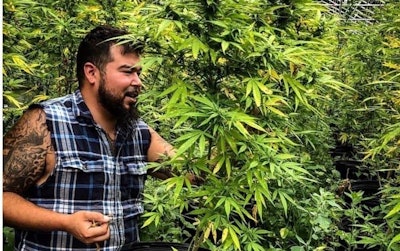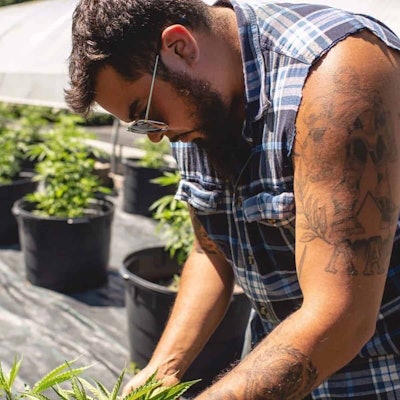
Between dealing with a hemp oversupply from the 2019 growing season and resulting price drop, undeveloped infrastructure to process the crop on a wide scale for industrial uses, and unscrupulous industry actors, U.S. hemp growers in 2020 could have used a lifeboat. Instead, many were lent an anchor—the COVID-19 pandemic pummeled various industries, including CBD.
Minority-owned hemp businesses are among those who experienced challenges in 2020 but are looking to move forward as best as they can. Hemp Grower spoke with a minority grower and association leader about this year’s challenges and the next year’s opportunities.
“With small businesses taking a large hit, that's where most of, I believe, the minority hemp community does a lot of their sales, is more in the mom-and-pop sector, versus the large industrial warehouses,” said Luis Vega, owner, grower and jack of all trades at WEPA! Farms in Connecticut.
Vega, a Puerto Rican who hails from Brooklyn, New York, launched WEPA! with $150,000 in life savings and started growing in 2019. WEPA! grows 10 acres of hemp for biomass and smokable flower, with its growing space split between farmland that it rents in Shelton, Conn., and a co-op with O’Hara’s Nursery in Monroe, Conn.
He and his small team also perform processing for a variety of products, some of which they private-label for farm stands across the Northeast. Adelso Fernandez, the business’ pharmacist, creates product formulations for other companies.
WEPA!'s partners in Monroe (O'Hara's) and Shelton--Stone Gardens Farm, a craft butchery that grows local native corn and raises cows—are family-owned and operated.

with permission
This family-run segment of the industry, Vega said, operates “… the same way it was probably 100 years ago. And it was the same way 100 years ago for my family back in Puerto Rico.”
COVID-19 restrictions on retail-store capacity are limiting WEPA!’s ability to conduct retail out of its Shelton store. “As people come in and out of our storefront, we can't have the same amount of people coming [to the store],” Vega said. “It's winter—nobody really looks to stay outside. Sales are down, but we’re still trucking along.”
Minority-owned hemp businesses, particularly in processing, often have trouble breaking into the market and selling their product, Vega said. The Minority Cannabis Business Association (MCBA) and the U.S. Hemp Roundtable (USHR) held a recent webinar that addressed this topic.
“When we look back to the tobacco or alcohol industries, they have regionalized buyers; ultimately, somebody's coming from a company, goes into an area; they know that that area's great at producing something,” Vega said. “They buy out farms, and now [they] have that direct-to-processing line. And in the hemp world, we don't have that just yet.”
Vega, who is a member of MCBA, said that organization has helped WEPA! “navigate the marketing and compliance worlds with greater ease. When I need a little guidance, I can normally send an email and get someone to share some information.” He also recently received a $150,000 investment from MCBA and Merida Capital Partners through their i2 accelerator.
In addition, Vega is a member of Minorities for Medical Marijuana (M4MM). “They've been great at supporting us and connecting us,” he said.
Roz McCarthy, M4MM’s founder and CEO, said she would like to see hemp growing in urban areas, such as Baltimore, Chicago, Detroit and Newark, N.J., as part of soil remediation efforts.
Whether that happens remains to be seen, but, she said, “With President-Elect Biden, it looks like he's going to have a really strong team that's going to look at [the] environment and look at climate control, and hemp is a product that keeps giving and giving and giving.”
Addressing business opportunities, McCarthy cited how M4MM National Director for Hemp Technology Jackson Garth, through his company Verde Leaf, is working with growers in various ways.
“He has farmers throughout the country that have—and these are not just minority … farmers—they are Black farmers, Brown farmers, white farmers—they’ve all partnered together and basically, under his brand, are going after contracts together, they're creating new product lines together,” McCarthy said.
With hemp being a newly reestablished industry, McCarthy pointed out that hemp growers have had to learn on the job, which has led to both successes and failures.
For his part, Vega applauds how the hemp industry pushed through this year. “I'm very proud to see a lot of people pull through, and did as much as possible, bootstrapped it,” Vega said. “It really showed the resiliency of the community lending a hand during this time. So, that was 2020 for me."
























